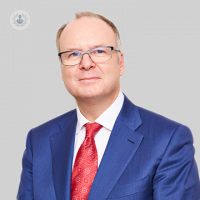Genioplasty FAQs
Written in association with:Consultant craniofacial plastic surgeon, Mr Simon Eccles answers the most commonly asked questions about genioplasty. From procedure to recovery, it's all covered here.

What is genioplasty?
Genioplasty is the medical name for surgery to change the construction of the chin. This can involve making it bigger or smaller, more or less protruding, or more symmetrical. The shape of the chin is also considered during assessment for rhinoplasty surgery, as symmetry and equal prominence of the nose and chin are usually recommended to people seeking aesthetic improvements.
How is genioplasty performed?
It is a relatively simple procedure which involves repositioning the chin by cutting the lower jaw bone, below the roots of the teeth, through incisions made on the gum lining inside the mouth, which ensures that there is no visible scarring on the face. The chin is then placed in the desired position and reattached with metal plates and screws. This procedure has no effect on the way the patient chews and eats after the surgery as the position of the teeth will not be changed.
Chin augmentation using implants made of bone or synthetic materials is also possible using the same openings as for chin reduction surgery or by making a small cut in the skin underneath the chin.
How are patients assessed before a genioplasty?
Although most craniofacial surgeons tend to prefer using the patient's own bone, both techniques have their merits. A decision on which one will be used is reached after consultation between surgeon and patient. X-rays of the jaws are usually performed in order to aid the planning of the operation.
How long will I need to stay in hospital?
Most patients experience mild discomfort after the procedure, which requires an overnight stay in hospital. However, an overnight stay is not always necessary after minor facial procedures, so the surgeon will usually give advice on this based on individual circumstances.
What is the recovery time from genioplasty surgery?
Recovery time usually depends on which type of procedure was performed. In the 24 hours after the procedure, the chin will feel swollen or tight, however, the majority of patients will be able to go home the day after the surgery. The amount of swelling and bruising experienced varies case-by-case but lasts longer after procedures using the patient's own bone. The swelling usually heals after around two weeks, although some less obvious swelling may take months to disappear. Patients can eat normally after surgery, but softer foods are recommended for the first few days.
How long does genioplasty surgery last?
The duration of this type of procedure depends on which technique is used and how drastic the patient wants the change in shape to be. Generally speaking, bone surgery is the better long-term option as it is more predictable due to the risks of migration and infection that come with implant techniques.
Mr Simon Eccles is an esteemed consultant craniofacial plastic surgeon practicing in London. You can request an appointment with him by visiting his profile.


